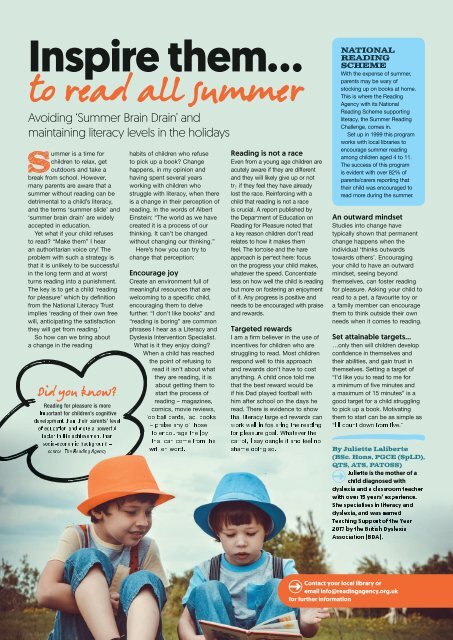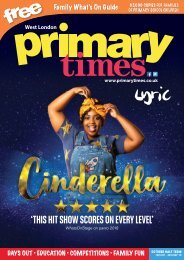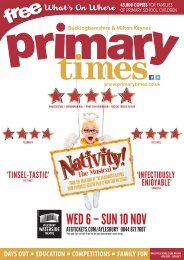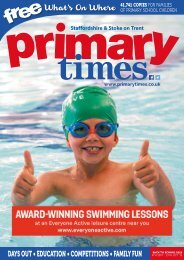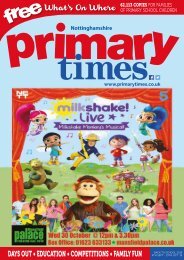Primary Times North London Summer 18
You also want an ePaper? Increase the reach of your titles
YUMPU automatically turns print PDFs into web optimized ePapers that Google loves.
Inspirethem…<br />
to read all summer<br />
Avoiding ‘<strong>Summer</strong> BrainDrain’and<br />
maintainingliteracylevelsinthe holidays<br />
<strong>Summer</strong> is atime for<br />
children to relax, get<br />
outdoors and take a<br />
break from school. However,<br />
many parents are aware that a<br />
summer without reading can be<br />
detrimental to achild’s literacy,<br />
and the terms ‘summer slide’ and<br />
‘summer brain drain’ are widely<br />
accepted in education.<br />
Yetwhat if your child refuses<br />
to read? “Make them” Ihear<br />
an authoritarian voice cry! The<br />
problem with such astrategy is<br />
that it is unlikely to be successful<br />
in the long term and at worst<br />
turns reading into apunishment.<br />
The key is to get achild ‘reading<br />
for pleasure’ which by definition<br />
from the National Literacy Trust<br />
implies ‘reading of their own free<br />
will, anticipating the satisfaction<br />
they will get from reading.’<br />
So how can we bring about<br />
achange in the reading<br />
Did you know?<br />
Reading for pleasure ismore<br />
important for children’s cognitive<br />
development than their parents’ level<br />
of education and more a powerful<br />
factor in life achievement than<br />
socio-economic background –<br />
source: The Reading Agency.<br />
habits of children who refuse<br />
to pick up abook? Change<br />
happens, in my opinion and<br />
having spent several years<br />
working with children who<br />
struggle with literacy, when there<br />
is achange in their perception of<br />
reading. In the words of Albert<br />
Einstein: “The world as we have<br />
created it is aprocess of our<br />
thinking. It can’t bechanged<br />
without changing our thinking.”<br />
Here’s how you can try to<br />
change that perception:<br />
Encourage joy<br />
Create an environment full of<br />
meaningful resources that are<br />
welcoming to aspecific child,<br />
encouraging them to delve<br />
further. “Idon’t like books” and<br />
“reading is boring” are common<br />
phrases Ihear as aLiteracy and<br />
Dyslexia Intervention Specialist.<br />
What is it they enjoy doing?<br />
When achild has reached<br />
the point of refusing to<br />
read it isn’t about what<br />
they are reading, it is<br />
about getting them to<br />
start the process of<br />
reading –magazines,<br />
comics, movie reviews,<br />
football cards, fact books<br />
– praise any ofthose<br />
toencouragethejoy<br />
thatcancomefromthe<br />
writtenword.<br />
Reading is not arace<br />
Even from ayoung age children are<br />
acutely aware ifthey are different<br />
and they will likely give up or not<br />
try<br />
if they feel they have already<br />
lost the race. Reinforcing with a<br />
child that reading is not arace<br />
is crucial. Areportrt published by<br />
the Department of Education on<br />
Reading for Pleasure noted that<br />
akey reason children don’t read<br />
relates to how it makes them<br />
feel. The tortoise and the hare<br />
approach is perfect here: focus<br />
on the progress your child makes,<br />
whatever the speed. Concentrate<br />
less on how well the child is reading<br />
but more onfostering an enjoyment<br />
of it. Any progress is positive and<br />
needs to be encouraged with praise<br />
and rewards.<br />
Targeted rewards<br />
Iamafirm believer in the use of<br />
incentives for children who are<br />
struggling to read. Most children<br />
respond well to this approach<br />
and rewards don’t have to cost<br />
anything. Achild once told me<br />
that the best reward would be<br />
if his Dad played football with<br />
him after school on the days he<br />
read. There isevidence to show<br />
that literacy targeted rewards can<br />
work well in fostering the reading<br />
for pleasure goal. Whatever the<br />
carrot, I say dangle it and feel no<br />
shame doing so.<br />
NATIONAL<br />
READING<br />
SCHEME<br />
With the expense of summer,<br />
parents may be wary of<br />
stocking up on books at home.<br />
This is where the Reading<br />
Agency with its National<br />
Reading Scheme supporting<br />
literacy, the <strong>Summer</strong> Reading<br />
Challenge, comes in.<br />
Set up in 1999 this program<br />
works with local libraries to<br />
encourage summer reading<br />
among children aged 4to11.<br />
The success of this program<br />
is evident with over 82% of<br />
parents/carers reporting that<br />
their child was encouraged to<br />
read more during the summer.<br />
An outward mindset<br />
Studies into change have<br />
typically shown that permanent<br />
change happens when the<br />
individual ‘thinks outwards<br />
towards others’. Encouraging<br />
your child to have an outward<br />
mindset, seeing beyond<br />
themselves, can foster reading<br />
for pleasure. Asking your child to<br />
read to apet, afavourite toy or<br />
afamily member can encourage<br />
them to think outside their own<br />
needs when it comes to reading.<br />
Set attainable targets…<br />
…only then will children develop<br />
confidence in themselves and<br />
their abilities, and gain trust in<br />
themselves. Setting atarget of<br />
“I’d like you to read to me for<br />
aminimum of five minutes and<br />
amaximum of 15 minutes” is a<br />
good target for achild struggling<br />
to pick up abook. Motivating<br />
them to start<br />
can be as simple as<br />
“I’ll count down from five.”<br />
By Juliette Laliberte<br />
(BSc. Hons, PGCE (SpLD),<br />
QTS, ATS, PATOSS)<br />
Juliette is themother of a<br />
childdiagnosed with<br />
dyslexia and a classroom teacher<br />
with over 15 years’ experience.<br />
She specialises in literacy and<br />
dyslexia, and was named<br />
Teaching Support of the Year<br />
2017 by the British Dyslexia<br />
Association (BDA).<br />
Contact your local libraryor<br />
email info@readingagency.org.uk<br />
forfurther information


